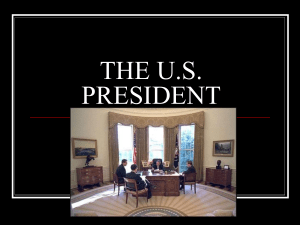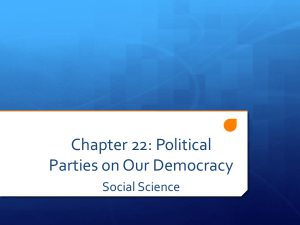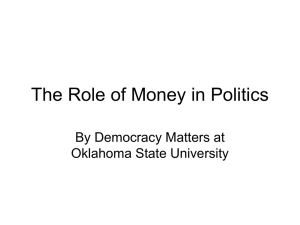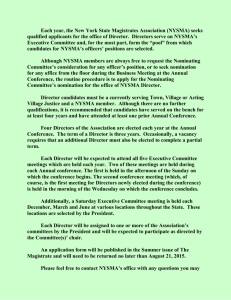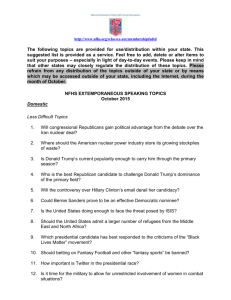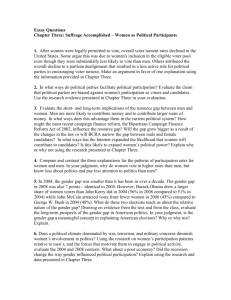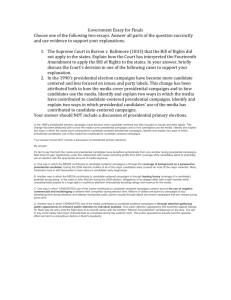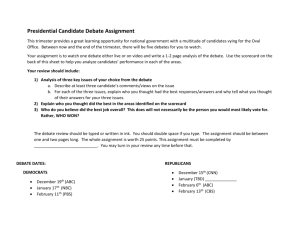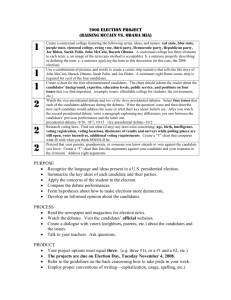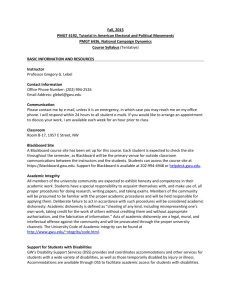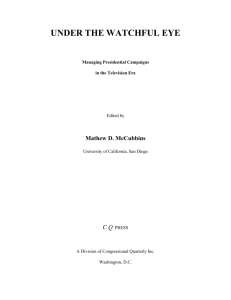Midterm Review Sheet - University of San Diego Home Pages
advertisement
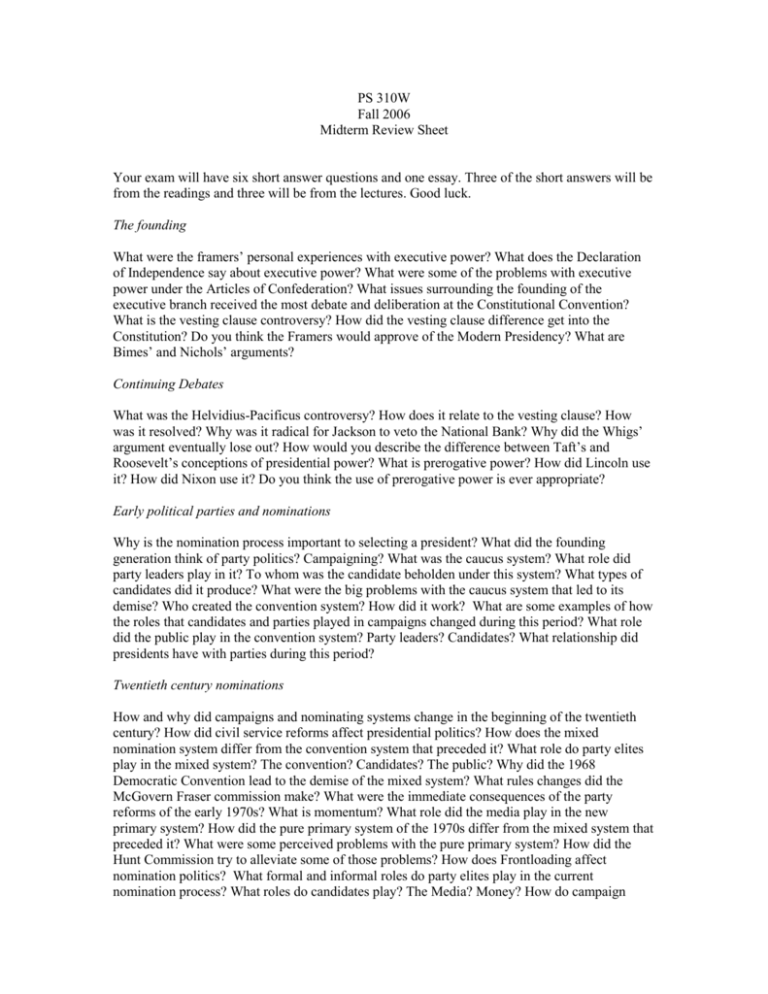
PS 310W Fall 2006 Midterm Review Sheet Your exam will have six short answer questions and one essay. Three of the short answers will be from the readings and three will be from the lectures. Good luck. The founding What were the framers’ personal experiences with executive power? What does the Declaration of Independence say about executive power? What were some of the problems with executive power under the Articles of Confederation? What issues surrounding the founding of the executive branch received the most debate and deliberation at the Constitutional Convention? What is the vesting clause controversy? How did the vesting clause difference get into the Constitution? Do you think the Framers would approve of the Modern Presidency? What are Bimes’ and Nichols’ arguments? Continuing Debates What was the Helvidius-Pacificus controversy? How does it relate to the vesting clause? How was it resolved? Why was it radical for Jackson to veto the National Bank? Why did the Whigs’ argument eventually lose out? How would you describe the difference between Taft’s and Roosevelt’s conceptions of presidential power? What is prerogative power? How did Lincoln use it? How did Nixon use it? Do you think the use of prerogative power is ever appropriate? Early political parties and nominations Why is the nomination process important to selecting a president? What did the founding generation think of party politics? Campaigning? What was the caucus system? What role did party leaders play in it? To whom was the candidate beholden under this system? What types of candidates did it produce? What were the big problems with the caucus system that led to its demise? Who created the convention system? How did it work? What are some examples of how the roles that candidates and parties played in campaigns changed during this period? What role did the public play in the convention system? Party leaders? Candidates? What relationship did presidents have with parties during this period? Twentieth century nominations How and why did campaigns and nominating systems change in the beginning of the twentieth century? How did civil service reforms affect presidential politics? How does the mixed nomination system differ from the convention system that preceded it? What role do party elites play in the mixed system? The convention? Candidates? The public? Why did the 1968 Democratic Convention lead to the demise of the mixed system? What rules changes did the McGovern Fraser commission make? What were the immediate consequences of the party reforms of the early 1970s? What is momentum? What role did the media play in the new primary system? How did the pure primary system of the 1970s differ from the mixed system that preceded it? What were some perceived problems with the pure primary system? How did the Hunt Commission try to alleviate some of those problems? How does Frontloading affect nomination politics? What formal and informal roles do party elites play in the current nomination process? What roles do candidates play? The Media? Money? How do campaign finance rules affect candidate strategy? What are the pros and cons of having a national primary to select the party nominees for president? Parties and Third Parties What constitutional, legal, and cultural features of the American political system disadvantage third parties? What factors make it more likely that a third party presidential candidate will do well? What do you think would qualify as success for a third party presidential candidate? In what sense is it “throwing away your vote” to vote for a third party candidate? In what ways does the nomination process in general impose constraints on presidential candidates and the presidents who are elected? How have those constraints changed over time? To what degree do you think presidential candidates are beholden to their parties today? In what ways are parties resources for the president? Presidential Elections In what ways does the Electoral College affect presidential campaign strategy? How would a direct election change that strategy? How would proportional allocation of electors from each state change that strategy? How are general election campaigns financed? How are primary campaigns financed? What are the pros and cons of appealing to base voters and swing voters? What are the characteristics of a modern campaign organization? How does it differ from a 19th century campaign organization? What are the four different types of television advertisements that a candidate can run? What are the pros and cons of running each type? Voters How much do voters know about politics? How much do you think they need to know in order to make an informed decision in voting for president? How do voters make up their minds? What is the funnel of causality? What are the stages within the funnel? Which comes first? Which do you think is most important? Why? What is the median voter theorem? Why does it encourage candidates to minimize controversial positions in the general election? Why do some voters say there are no differences between the candidates? Under what circumstances can we say that presidents win mandates to enact specific policies? Press and Campaigns How do the incentives facing the press affect the news coverage of presidential campaigns? What are some examples of ways in which candidates can try to control the media coverage of their campaigns? How do media workways encourage campaigns to be staged? What are some examples from the Bush campaign of “staged” events? How do the media encourage candidates to simplify their messages? Press and the President Why does Kerbel argue that the media are too hard on presidents? Why does Sparrow argue that the media are not too hard on presidents? What is framing? Priming? How does the media affect public opinion? How has the media changed since the “Golden Age?” How do trends in the business of news affect the news coverage of the president? What are some ways in which the president tries to control the media? To what degree can the media serve as a check on presidential power? Public Opinion How do people form opinions about the president’s job performance? What are approval ratings really measuring? Why is public approval important to the president? In what ways is it a resource? A Constraint? What is Going Public? How does Kernell argue Washington has changed over time? What are institutionalized and individualized pluralism? Why is Going Public a more common strategy today than it used to be? Is public opinion more of a resource for presidents now than it used to be? How can presidents manipulate public opinion? Rally Effects What is a rally effect? What circumstances give rise to one? What advantages does a president gain by focusing his attention on international rather than domestic affairs? Do presidents face fewer constraints during a perceived crisis? If so, why? Sample Question (and Sample Perfect Answer): What is frontloading and why are its consequences? Definition: --When states move their primary elections earlier and earlier in the election year. Significance: --favors candidates who have raised lots of money before the primary season begins, and favors candidates with a national reputation, more money, and more support among party insiders. --helps party insiders gain some control back from primary voters over the nomination and the nominee Full sentences or a complete sketch are acceptable.
